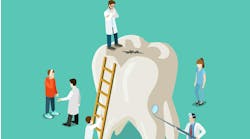BY Rick Workman, DMD
We all encounter negativity. It exists and presents itself each day, and as I'm sure you know, dentists are not immune to this. Scheduling conflicts, team member issues, or other office difficulties are bound to occur and cause you to question your resolve and decision making.
But in developing and implementing certain mental traits, you can learn to handle these problems correctly. In his best-selling book, The Four Agreements, Don Miguel Ruiz explains that many of the personal agreements we make with ourselves each day, such as making assumptions and self-criticizing, often diminish our self-worth and obstruct our growth. He discusses four simple and effective agreements we can adopt to overcome these destructive thoughts and actions, which can be applied to dentistry. You face challenges each day in your office that test your expertise and resolve. By using these four agreements as guiding principles, you can maintain a positive mindset to overcome the challenges.
Be impeccable with your word - Instead of speaking negatively about yourself or others, speak with truth, integrity, and optimism. Say only what you mean and believe in what you're saying. When communicating with patients, be authentic and genuine with your caring message, which is far more effective than any sales pitch. It all starts with your beliefs. Do you truly embrace lifetime care for your patients? If so, then let your passion come through in your voice and words. Patients will listen and respond.
Don't take things personally - Your actions rarely determine the actions of everyone else. What others do stems from their own mindset and way of thinking; therefore, it's pointless to become personally distressed over others' viewpoints. Make yourself invulnerable to the actions and opinions of those around you. Many times patients are scared or simply don't understand certain aspects of their treatment, which causes them to react negatively. As dentists, we tend to take this to heart and blame ourselves. However, you shouldn't take this negativity personally. If a patient is aggravated with a situation, that doesn't mean you're the cause of their unhappiness. Provide your patients with proficient care in a considerate, understanding manner without taking their opinions and actions personally, and you'll have nothing to worry about.
Avoid assumptions - Ask detailed, thorough questions and communicate in a clear manner to avoid complications, misunderstandings, and inaccuracies. Many common problems in your practice can be avoided with this one simple agreement. When you're open, positive, and mentally flexible, you're able to understand and relate to patients and team members better. The more you understand your patients and team, the easier it is to communicate with them. Don't make assumptions about a patient's ability to pay for necessary treatment or their knowledge of that treatment. Don't assume that your team members can read your mind.
Be at your best habitually - This agreement sounds simple, but it's quite effective nonetheless. If you stay at the top of your game no matter what the situation, you'll have no reason to feel regret, disappointment, or unhappiness about your performance. It all starts the moment you walk in the door. Are you doing your best to be a leader at your team meeting? Are you on time? Are you staying positive for your team the entire day? Are you setting clear expectations for your team members to accomplish every day? The answer should be yes to all these questions. It's not easy to be at the top of your game every day, but continually ask yourself, "What's important now?"
Although committing to these agreements each day sounds easy, it's a challenging task. While these points may sound simplistic or generic, it is certain that over the course of a few years, the trajectory of your practice and life will be significantly and positively impacted. As one who has studied hundreds of dentists for many years, this is a self-evident fact.
Rick Workman, DMD, is founder and chief executive officer of Heartland Dental. After practicing full-time, Dr. Workman created Heartland Dental, a world-class dental support organization offering affiliated dentists nonclinical, administrative support. Heartland Dental has over 600 affiliated dental offices in 26 states. Dr. Workman may be reached at [email protected].





